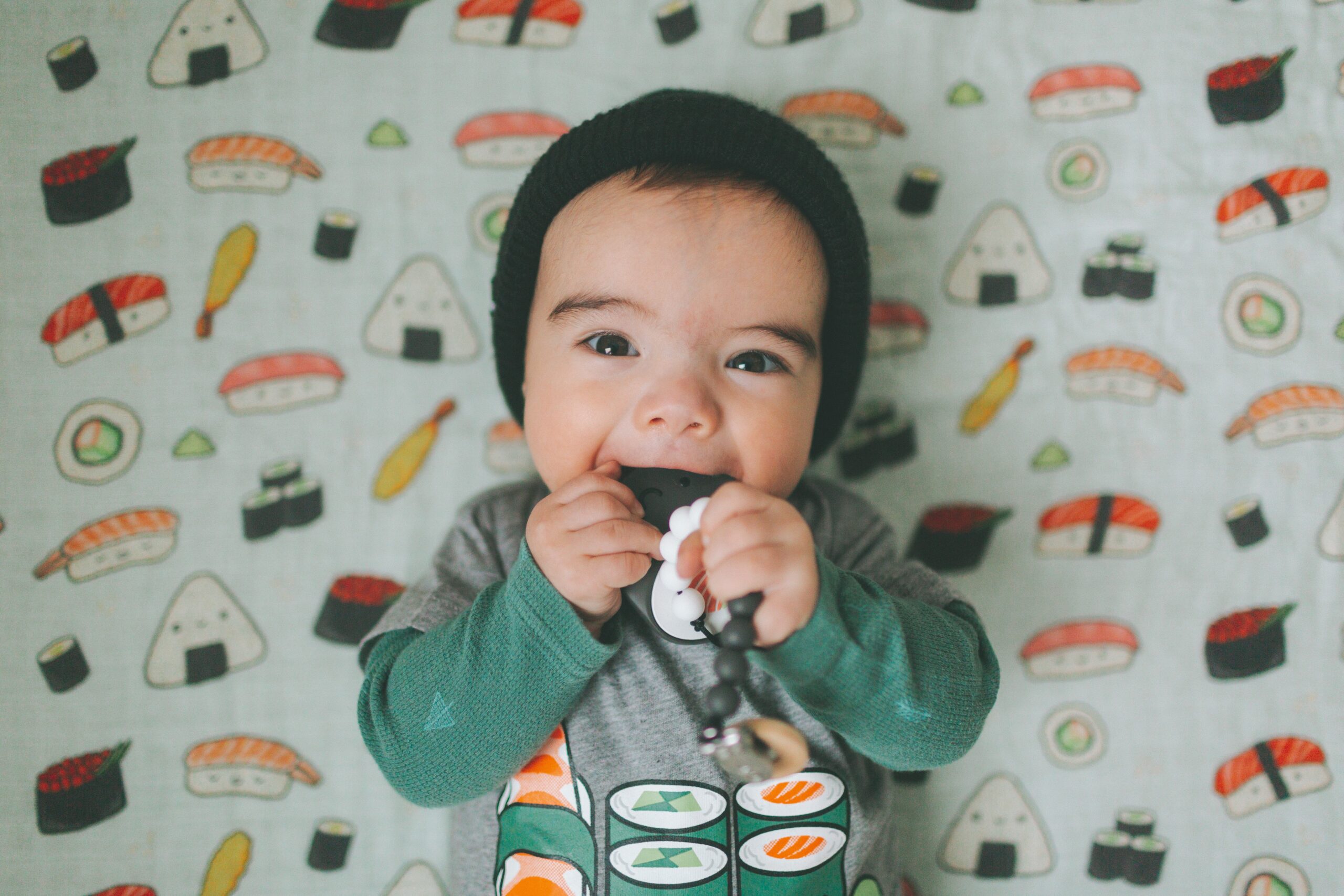No two infants are alike. When some babies get their first tooth, they don’t seem phased at all. While, for others, teething leads to crankiness, sleepless nights and lots of drool. So, whether you’re a first-time parent or you’ve been through the process before, it’s hard to predict how your baby will respond to this developmental milestone.
As a pediatric dentist in Missouri City, TX, we specialize in children’s oral health and development. We’re sharing some of our knowledge in this comprehensive guide to infant teething. Knowing what to expect, as well as what’s normal and what’s not, will go a long way in helping you breeze through this phase with confidence.
In the post, we’ll answer the following:
- When do babies start teething and what are the symptoms?
- How long do teething symptoms last?
- What are the best infant teething remedies and which ones should be avoided?
- How do you soothe a teething baby at night?
- When should you start brushing your baby’s teeth?
What Age do Babies Start Teething?
There’s a pretty big range when it comes to the age babies start teething. However, most infants get their first tooth between 6 months and 1 year. Baby teeth usually erupt in pairs. The bottom front teeth (lower central incisors) are often the first to erupt, followed by the top front teeth (upper central incisors). That said, the teething order can vary slightly from child to child.
The American Dental Association has a helpful baby teeth eruption chart that shows the entire timeline. As you can see, teething lasts quite a while. Most little ones will have all 20 primary teeth by 33 months of age.
Does teething hurt babies? Teething isn’t unbearably painful, but teething gums may be swollen and sore, causing discomfort. Because it’s a new sensation for a baby, it can be distressing. Again, some babies struggle with it, while others barely register teeth coming in. The good news is that after the first couple of teeth erupt, teething tends to get easier.
What are the Symptoms of Teething in a Baby?
The most common teething symptoms include:
- Drooling
- Irritability
- Chewing on everything in sight
- Face rash due to the drool irritating the skin
- Red, swollen and/or sore gums
- Sleeplessness
- Lack of appetite
Teething happens during a time of rapid growth and development. Because of this, multiple things can be going on at once, and a variety of issues often get attributed to teething. Let’s cover some of these symptoms to give you a better idea of whether they are actually a result of teething or a sign of another problem.
Does teething cause a runny nose?
This one is up for debate. If you ask a random group of parents, many of them will probably tell you that, yes, their baby had a runny nose while they were teething. A study published in Pediatrics backs this up. The researchers found a correlation between the eruption of baby teeth and a mild runny nose.
Other studies and experts, however, have found no association between the two. If your child’s runny nose is moderate to severe or it’s still going strong 24 hours after the tooth erupts, then it’s probably not related to teething.
Does teething cause diarrhea?
There are endless claims that teething can cause diarrhea. But there isn’t solid scientific evidence to support the claims, and most medical professionals don’t believe diarrhea is a teething symptom.
In fact, a few other changes occur between the ages of 6 months and 1 year that could contribute to an infant having diarrhea while teething, including:
- The introduction of solid foods
- The loss of maternal antibodies that were transferred to the baby at birth, making them more susceptible to viruses and bacteria
- The developmental milestone of putting fingers and objects in their mouth
If your baby does have diarrhea, it’s a good idea to check in with your pediatrician instead of chalking it up to teething, because no matter what the cause is, it can lead to dehydration.
Does teething cause diaper rash?
Teething can cause a rash around the mouth because the drool combined with chewing on things can irritate their skin. Teething doesn’t directly cause diaper rash though. But if your child has diarrhea for the reasons mentioned above, they could have diaper rash while a tooth is erupting.
Does teething cause earaches?
Teething can cause an earache since the pain from your infant’s teething gums may radiate to the ear. It’s also difficult for small children to pinpoint where pain is coming from, so they might pull at their ear, particularly when their molars erupt. Ear infections are not a teething symptom, however. They’re caused by bacteria or a virus instead.
Does teething cause a fever?
Several studies, including another study published in the journal Pediatrics, have found that teething causes a slight rise in temperature in the days leading up to getting a tooth and for a day after it erupts.
Though elevated, the temperatures of the infants in the study didn’t reach 100.4 F or higher, which is what doctors consider a fever. So if your baby has a true fever while a tooth is coming in, it’s still a good idea to call your pediatrician.
How Long do Teething Symptoms Last?
Teething symptoms usually begin a few days before the baby tooth comes in and continue for a day or two after.
What are the Best Teething Remedies for Infants?
The sheer volume of baby teething remedies available can be pretty overwhelming. The team at The Beach House Pediatric Dentistry & Orthodontics is here to tell you that you don’t need to buy a bunch of special supplies. In fact, the natural teething remedies parents have been using for generations are still among the most effective.
Here are some of the safest, pediatric dentist-approved ways to soothe your baby’s teething gums:
- Soak a clean washcloth in breast milk, formula or water. Put the washcloth in the refrigerator or freezer to chill and then give it to your baby to chew on.
- Another of the best natural teething remedies is a gum massage. Using a clean finger or a moistened sterile gauze pad, massage your baby’s gums. The counter-pressure helps to relieve pain.
- If your baby’s gums are swollen, you can take the gum massage up a level. Chill a spoon in the refrigerator and gently press the rounded side of the spoon against their gums. Only do this before the baby tooth erupts, because you don’t want to chip it by accident, and never chill the spoon in the freezer as the metal can get way too cold.
- Give your baby a teething toy to chew on. Go for a solid, BPA-free toy or a plush one. The teething toys that have liquid in them can break as an infant chews them, releasing whatever is inside. For extra pain relief, put the toy in the refrigerator to get cold before offering it to your baby.
- If your baby has started eating solid food, feed them chilled vegetable or fruit purees to numb their sore gums. You can also use one of those mesh feeders filled with cold fruit.
- Teething biscuits are another good option. Most types are for babies 8 months and up, so check the package before giving one to your child. After they eat the biscuit, wipe down their gums with some moistened gauze or a washcloth.
- Don’t underestimate the power of distraction! If your teething infant is really fussy, go for a walk, read them a story or try a change of scenery.
- Lastly, if none of the teething remedies work and your baby seems very uncomfortable, ask your pediatrician about an over-the-counter pain reliever like baby Tylenol or Motrin.
Which Teething Remedies Should I Avoid?
When trying to relieve your baby’s teething pain, avoid:
- Homeopathic Teething Tablets and Medications – The FDA cautions parents against using homeopathic teething tablets and medications. Its laboratory analysis found inconsistent amounts of belladonna, a toxic substance, in certain teething tablets, often far exceeding what was listed on the label. This poses the most risk for children under the age of 2. It’s also important to note that the FDA doesn’t evaluate or approve homeopathic remedies for safety or efficacy.
- OTC Teething Medications Containing Lidocaine or Benzocaine – Over-the-counter products that feature these anesthetic drugs, such as Baby Orajel and Anbesol, can be dangerous, or even deadly, for infants and young children. According to research, they also provide little to no benefit.
- Teething necklaces, anklets and bracelets – According to the American Academy of Pediatrics and the FDA, teething jewelry, including the popular amber teething necklaces, are a choking and strangulation hazard. If you do decide to use teething jewelry, keep a close eye on your baby while they’re chewing on it, put it on their wrist or ankle instead of their neck and take it off before putting them down for a nap or bed.
Exercise caution with the teething necklaces that parents wear too. Supervise your infant while they’re chewing on it, and make sure the jewelry is purchased from a reputable source that clearly labels all of the materials it’s made from. Certain ones have been found to contain lead.
How to Soothe a Teething Baby at Night
It seems like just as your baby starts sleeping through the night, teething strikes! Fortunately, it’s temporary and there are things you can do to soothe your infant, so everyone in your household can get some rest. Here are a few tips we share with the parents at our practice:
- Stick to your usual bedtime routine. Don’t have one yet? It’s a great time to start. Familiar rituals like a bath, a story and a feeding will help your baby feel calm and secure when it’s time to go to sleep.
- Wipe any drool off of your baby’s face before bed so they don’t get a rash. If the skin is already irritated, you might also want to try a baby-friendly moisturizer.
- After feeding your infant, use a moist piece of gauze or a finger toothbrush to gently clean and massage their gums before you put them down for the night.
- Take a cue from research published in the British Medical Journal and use a white noise machine in your baby’s nursery. 80% of the babies in the experimental group fell asleep within five minutes in response to white noise. Only 25% of the babies in the control group fell asleep spontaneously.
- If your infant is constantly getting up in the middle of the night because of the discomfort and all else fails, again, ask your pediatrician about giving them an over-the-counter pain reliever.
- If your baby wakes up, wait a few minutes before going in to comfort them. See if they’re able to self-soothe and put themselves back to sleep. If they can’t, you may want to try massaging their gums again.
When Should You Start Brushing Your Baby’s Teeth?
When your baby gets their first tooth, you can start brushing it with an infant-sized, soft-bristled toothbrush. Use a tiny smear of toothpaste, no larger than a grain of rice. Brush twice a day to get into the habit. You won’t need to floss their teeth until any two teeth are touching.
Schedule Your Baby’s Dental Exam in Missouri City, TX
We hope our guide to infant teething helps you navigate your baby’s smile development. If you have questions, concerns or your baby is approaching their first birthday, schedule an exam at The Beach House Pediatric Dentistry & Orthodontics.
Our board-certified pediatric dentists Dr. Kristi Parker and Dr. Fabiola Sosa-Banda know how to put babies and toddlers at ease. They’ll check your child’s teeth (if they have any!) and gums and fill you in on everything you need to know about keeping their smile healthy. They can also offer personalized guidance and recommendations for managing teething.


